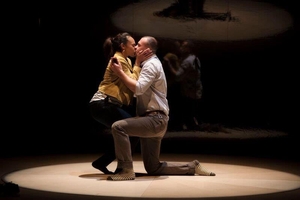Constellations, the Centaur’s season opener running until October 30th is an existential exercise that is almost as inaccessible as the theatre on St. Francois Xavier itself these days. The narrow street in front of the Centaur, like almost every other street in the city, has been ripped up. You have to make your way around barricades across planks and around heavy machinery to get through the front doors of the playhouse.
But the effort is worth it.
The play, by British playwright Nick Payne is a melodramatic duet about love, death and the whole damn thing crammed into 70 mind-blowing minutes. It is one of those plotless shows with an enigmatic ending like Beckett’s Waiting For Godot in which nothing seems to happen while everything is happening.
Constellations examines the relationship (or is it the lack of one) between two people who meet at a party: Roland, a beekeeper, and Marianne, a Cambridge University professor who happens to be an authority on “theoretical early universe cosmology.”
 Payne bases his script on the idea of a multiverse in which different outcomes to the same event are possible. That provides the framework for the looped dialogue, the convoluted multiple versions of the same scene. It is a rift that juggles an infinite number of possibilities involving human relationships, free will, fate and quantum physics. You see a scene performed once, you listen to it again with a different emphasis, and the same scene is repeated a third time, often with humorous or devastating effect. (One scene is even acted out in sign language).
Payne bases his script on the idea of a multiverse in which different outcomes to the same event are possible. That provides the framework for the looped dialogue, the convoluted multiple versions of the same scene. It is a rift that juggles an infinite number of possibilities involving human relationships, free will, fate and quantum physics. You see a scene performed once, you listen to it again with a different emphasis, and the same scene is repeated a third time, often with humorous or devastating effect. (One scene is even acted out in sign language).
According to the stage directions each scene shift indicates “a change in the universe,” As Marianne explains in what sounds like total gibberish to many, “In the quantum multiverse, every choice, every decision you’ve ever made and never made exists in an unimaginably vast ensemble of parallel universes”
Efficiently directed Peter Hinton, Constellations is, however, as much an emotionally remote experience as it is theatrical one.
This co-production with Toronto’s Canadian Stage is, nevertheless entertaining and never boring thanks to its two principle actors Cara Ricketts and Graham Cuthbertson. They are up to the challenge, comfortable and disciplined in their roles, always captivating with each repetition. Their dialogue is punctuated by cellist Jane Chan.
The spare set with its reflecting rear wall and revolving stage designed by Michael Gianfrancesco has been lit by Andrea Lundy to suggest an otherworldly experience. But in spite of the skilled actors and the beautiful staging the overall effect is murky and obscure. There are, after all, only so many ways to consider the facets of a gem before you lose interest in its lustre. In physics, so I am told, time stands still as we move from expectation, through experience, into memory.
When Constellations ended I was left thinking about something Marianne says as she may (or may not have been ) dying. “We’ve had all the time we have always had. You will still have all our time, there is not going to be any more of it.”
Then I walked out wondering why it is impossible to lick the tips of your elbows.
You have to see it to know what I mean.
.
